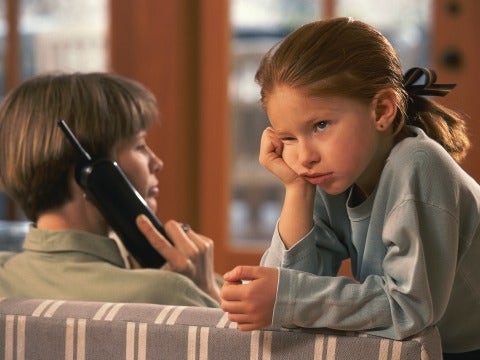Chill Out With Your Child: 4 Activities To Try When You Get Bored
A play date will help your child grow and experience a variety of interesting experiences.

What do you do when your toddler starts to drive you crazy? First, it's better to acknowledge how you are feeling rather than pretend you're feeling fine and just soldier on. Kids can pick up how we feel, even if we are trying to put a good face on, and this can affect them. Secondly, it's important to realize that we cannot be (nor are we meant to be) all things to our children. A very critical part of parenting is about preparing, encouraging and allowing our children to engage with the world around them. That means with other people too and not just us. So, if your child is wearing you out with continual requests for playing pretend, doing crafts, playing with music or participating in athletic activities, he/she may be indicating they are ready for more than what you can (or should) provide yourself.
Here are some options for parents to expand on their children’s play experiences:
1. A Play Date
Play dates with other children can be a great way to take the focus off of yourself as the prime entertainer and playmate. Go slowly and at your child's pace. Some children want to get involved right away, while others prefer taking some time to observe before joining in. There isn't a best approach—whatever your child is most comfortable with is correct for him or her. You can support your child to the degree he needs. Even if you stay while the play date occurs (either in your home or someone else's), your child will have the opportunity to engage and interact with others present, and so will you. This creates a good break and provides some fun for both of you!
2. A Fieldtrip
Field trips are a great activity for your child to explore, learn about something new, walk around and even run a bit. So, whether it's a children's museum that permits touching and other physical interaction with the exhibits, or the local petting zoo, community garden, park after the most recent snowfall or construction site (a great must-see for all those Bob the Builder fans), think about where you and your child could go and enjoy something different from your usual routine. Field trips are much more active than watching TV and is a great bonding experience for the two of you. If you feel inspired to take a few photos or even a short video at the time, you will have even more to review, discuss and show others together.
3. A Playgroup
This may range from a structured "mini-class" to a more casual, drop-in free play situation. Playgroups often engage in activities (i.e. play, music, cooking, movement, or crafts) that you can discuss with your child ahead of time. As with play dates, your child may want to dive right in, or he/she may want to check out the proceedings before joining in. Whatever their focus, playgroups allow young children to experience a variety of activities with peers and adults who are not their parents, which can be very helpful in setting a child up for a positive transition to Preschool and Kindergarten.
4. A Class
There are many class options for young children these days, ranging from gymnastics to art to music to free play. It probably makes sense to go with your child and observe a class first to gauge his/her interest in the activity and comfort level with potential classmates and how they're being taught. Do consider your child's stamina level and the time of day when the class meets to make sure that it occurs when he is most likely to be at his best. Starting classes at a young age can have a number of physical, social, cognitive and character benefits that children learn early on and take with them as they get older.
Remember, no matter how close and loving your relationship, both you and your children can benefit from periodic breaks from each other. This allows you each to recharge so that when you reunite, there are more and new experiences to discuss and share with each other. Your child's interest in experiences with others can be a very positive indicator of his/her maturity and readiness for new social interactions and environmental settings. And this is what we want as parents: for our children to be healthy, happy and to feel confident and capable in their world at whatever their age and stage of development.
Dr. Jeph is a clinical psychologist with a private practice in New York City. She can be reached via email or shoot her a note @DrJephTausig.
More parenting styles advice on YourTango:

